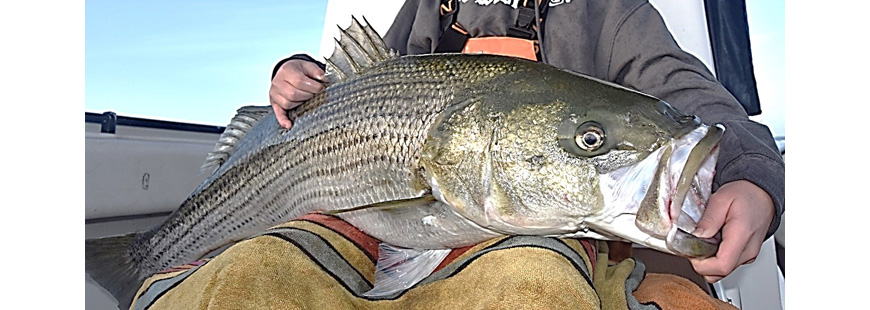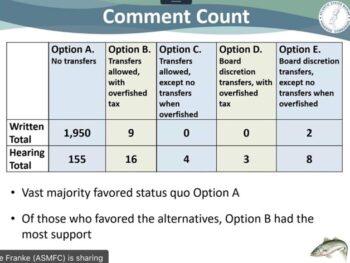Do Fishery Managers Actually Listen to the Public?
I’ve been there…and it’s incredibly frustrating.
For months, you do your best to educate folks on what are often complicated fishery management actions, explaining the options/alternatives that are on the table, and which one(s) will best protect the fishery and serve their/our interests.
You urge people to show up for public hearings…to write letters. Tell them their voices make a difference…that they need to speak up and be heard. And if you’re lucky, more than a few people will take time from their busy lives to write what are sometimes personal, detailed letters to managers, advocating for those options/alternatives that promote conservation. And sometimes there are thousands of comments supporting your position, while only a handful that support others.
Yet…in the end, managers go a completely different direction.
It’s not just frustrating, it’s often infuriating…but it’s not unusual.
Putting policy aside for a minute, let’s take a real, unbiased look at the role of public comment in the management process, and maybe we can understand why.
The Process
NOAA Fisheries, the eight federal Regional Fisheries Management Councils as well as the Atlantic States Marine Fisheries Commission (ASMFC) are all required to take public comment on proposed fishery management actions, the intent of which is to inform the management body’s decision-making process.
Depending on the action, there is at least one, and sometimes multiple, opportunities throughout the development of a proposed action when public comment is solicited.
Where that happens in the process can vary. Sometimes public comment is taken during “scoping,” when managers are trying to figure out what to include in the proposed management action. More often, it’s taken after the first iteration of a draft document, which contains various management options, is approved by managers for the public to comment on.
State hearings are scheduled and a public comment period (usually 30 to 60 days) is set. Stakeholders can speak during scheduled state hearings and/or can submit written comment at any point during the comment period.
After the completion of the public comment period, summaries of verbal and written comments are prepared by staff and provided to managers. The material is evaluated and considered at a meeting where decisions will be made on a draft management action.
In some cases, a second iteration of the draft document is completed, and it goes out to the public again before the Commission/Council meet to select preferred options/alternatives. NOAA Fisheries, of course, gives the final approval to any federal management action before it becomes official and goes into effect the following fishing season.
The Role of Public Comment
Absolutely, public input is a critical part of the process, for a number of reasons.
For one, it adds important context to Council and Commission deliberations. Managers need to know and understand what their constituents want, and perhaps more importantly how various options/alternatives will affect different stakeholders. And, there needs to be a public record of such. They also need to know that the public is paying attention, and that they will be accountable for the decisions they make.
But let’s be very clear about something. Public comment is NOT a referendum.
In other words, the majority of comments supporting a particular option or alternative (even if it’s an overwhelming number) does not require the Commission or Council to choose that option/alternative.
While on the surface this may seem unfair, it isn’t…for a few different reasons, the big one being what the founding fathers, in defense of a bicameral legislative body, described as a “tyranny of the majority” —a situation in which a group of people are treated unfairly because their situation is different from the situation of most of the people in a democratic country. Benjamin Franklin made things very clear when he said that “a democracy is two wolves and a sheep voting on what’s for lunch.”
It’s pretty obvious that in most cases anglers outnumber commercial interests, often by orders of magnitude. Managers are also well aware that if one or two angler interest groups push a campaign to solicit letters supporting the option/alternative they want, well, you end up with a VERY lopsided representation of stakeholders. Just because there are more anglers does NOT mean that managers are relieved of their duty to represent their commercial constituents.
The truth is that if management bodies simply did what the majority of public comment dictated, there likely wouldn’t be any more commercial fisheries, for like, anything. I certainly wouldn’t want that, and I really don’t think the vast majority of the public would either.
Striped Bass vs. Summer Flounder, Black Sea Bass and Scup
Yes, this blog was brought on by recent action on striped bass.
Some anglers aren’t happy about the Commission’s decision last week to postpone action on an addendum containing options that would allow for the transfer of commercial striped bass quota between states.
Because commercial quota isn’t fully utilized in some states, allowing for transfer to states which would most certainly use it would undoubtedly increase fishing mortality (albeit not very much when compared to recreational fishing mortality), while striped bass is still overfished, and in the midst of rebuilding.
Of course, speaking personally, I think that’s a terrible idea too. But my stakeholder perspective is that of an angler. If you’re a commercial fisherman, well, you likely look at things a little differently. The commercial fishery has been static for quite some time, while recreational mortality has increased to the point where we account for 90% of overall mortality. Commercial folks probably see it from a fairness standpoint. What’s likely to be a 1% increase in overall landings doesn’t appear to be much compared to the massive increase in recreational landings over the years.
To be clear though, the Commission’s Striped Bass board didn’t decide on a commercial transfer option; they moved to postpone until staff could give them a better idea of what effect it would have on rebuilding.
Still, anglers are furious that the Commission didn’t just dispense with the addendum, because after all, they provided over 2k comments for the status quo option (which doesn’t allow state transfers), whereas there were only 42 comments supporting one of the transfer options.
And I get that…because there’s a valid conservation/management argument for not allowing such commercial transfers between states. And given the precarious situation striped bass are in right now, that should be reason enough to throw the whole thing out.
But when you consider species like summer flounder, black seabass or scup, well, I can tell you first hand as a Council member (years ago) —if the Council simply made decisions based on majority public comment with those fisheries, then I’m just about certain they would all be overfished right now. Despite overwhelming public comment to increase harvest, managers focused on preventing overfishing and long term sustainability, primarily because federal law required them to. That’s not the case with the Commission, but let’s not get into that here.
The point is that, yeah, sometimes the public supports conservation and precautionary management, but sometimes it doesn’t. So absolutely, in the latter case, it’s a good thing that managers aren’t required to bend to the will of the masses. I mean, that could turn out pretty badly for the conservation side of things. And you really can’t say they should do what anglers say in this case, but not the others.
Brass Tacks
Some of the recent social media chatter on striped bass is concerning, and shows a basic misunderstanding of the role of public comment in the management process. And it’s sometimes coming from people who should know better. The majority of comments is still NOT a mandate, and public comment, while extremely important, is still advisory. You can’t always get what you want just because you got more comments supporting your position. If that were the case, we could end up in some pretty bad situations.
I do get why folks are upset. The overwhelming number of public comments supporting status quo wasn’t even really referenced at the Striped Bass Board meeting, and that is indeed troubling. But it certainly doesn’t mean that the commission is “corrupt” as some are claiming. I mean, the “follow the money” folks can’t honestly believe that managers are accepting bribes from wealthy commercial striped bass fishermen…because, well, I’m pretty sure there aren’t any.
In the end, the notion that managers ignore public comment isn’t just wrong, it’s destructive. Because conservation-minded anglers come to believe that their efforts are wasted…and that is NOT true at all.
There is no question that public comment informs the decision-making process. While it may sometimes seem like managers aren’t listening, they certainly are, so it is REALLY important that we continue to provide it.
Striped bass photo by John McMurray




Thank you John for the thoughtful article. While I can only speak for myself, I do believe the managers listen to the public comment, and they do care. From someone like yourself that has been deeply involved in the process, this insight is greatly appreciated.
I have been a professional fishing guide for 23 years. I have went to many scope meeting that discussed limit changes and overall fish health over the past 20 years. I agree that changes have to be made, but I don’t agree with ever change they decide on. I have voiced my opinion and I think it really depends on the objective if they really listen to the point that they care.It’s not like we vote on changes or not to change and the majority wins. Sometimes theie mind is made up and that’s it.
Great piece John and very informative to a recreational fisherman like myself who doesn’t know how much of this process works. I do sign petitions and write letters when encouraged to, and will continue to do so. My main takeaway here is that while the Commission may indeed make their decisions thoughtfully, they may do a better job of acknowledging the activist/vocal community of the engaged public. To not do so is just bad optics all around and as you point out, likely counterproductive long-term.
Pingback: You Can’t Always Get What You Want…Do Fishery Managers Actually Listen to the Public? - Moldy Chum